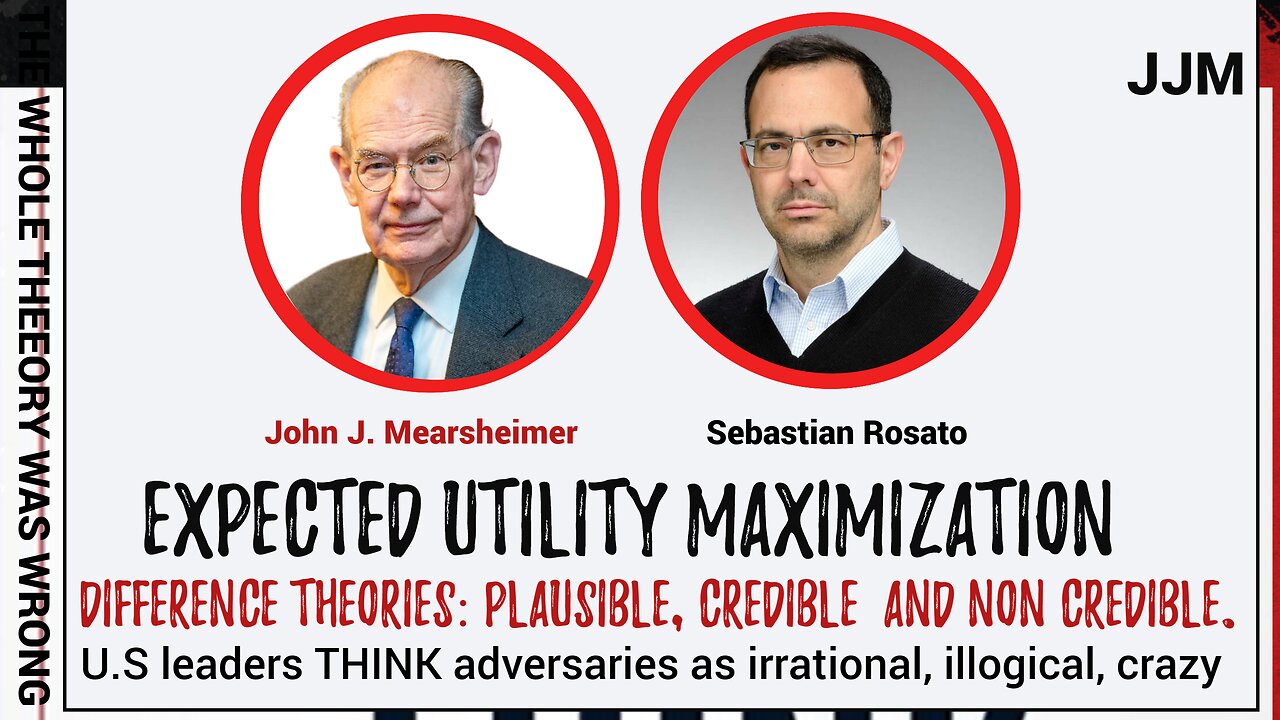Premium Only Content

John Mearsheimer argues that U.S leaders often portray their adversaries as irrational & delusional.
Political psychologist and the behavioral economist. To see whether states or individuals actually do act according to the dictates of expected utility maximization. But nevertheless, the key point is there is one definition of rationality, which is expected ability maximization that sits at the heart of both the rational. Toys. Political symbology, prison. And we are going after that. Definition of rationality and offering an alternative definition which focuses on theory and liberation. In their new book, How States Think Rationality of Foreign Policy, political scientist John Mearsheimer of the University of Chicago and Sebastian Rosado of the University of Notre Dame argue that these claims, and many similar ones, are often wrong because they're based on a flawed understanding of state, rationality, and international. I questioned Mayor Shimmer and Risotto about why they think most states act rationally most of the time in developing grand strategy and managing crises. Among other topics, we discuss how their theory is state rationality, differs from rational choice theorists and political psychologists. Why understanding state rationality is important to success in international affairs, and why Mearsheimer, A harsh critic of US expansion of NATO and of the US choice to pursue liberal in Germany after the Cold War, nonetheless argues in this book those decisions were rational how states think. John and Sebastian, your book is a defense of state rationality and international politics. And to this non IR scholar, it seems obvious that states exercise a kind of rough means end rationality in the sense of defining goals and seeking to adopt means suited to achieve those goals. One of your conclusions in the book is that most states are rational most of the time. Like that's a surprising conclusion. So I guess my first question is who doesn't think that's most states are rational most of the time? And why did you need to write this book? Well, Jack, I think when we first started writing about the topic. The first thing that struck us was that. Policymakers in the West love to talk about their adversaries as non rational. So you know, Saddam Hussein was right, irrational back in the day. Mahmoud Ahmadinejad, he go shopping as Gaddafi. The list goes on and on. And of course today is Vladimir Putin. So there's a. There is a large contingent in the policy community that thinks of US adversaries as not rational. Then this scholarship on non rationality, This is the so-called behavioral revolution, social sciences. It started in economics with the connectivity, the thinking, fast thinking, slow iterature. So we found that both in the policy world and in the academic world there was a lot of. Emphasis on non rationality. And we were surprised by that because we, like you, had always assumed that states were rational. In fact, it's the basis for how we've thought about international politics since the get go. So let me ask you when. When leaders say when American leaders you open the book talking about how. American leaders unanimously said that Putin was irrational, illogical, etcetera to invade Ukraine. And you just gave some other examples. Do you think that they mean that? Do they really think that Putin and Saddam Hussein, the like, are rational or is that empty talk? It's hard to be absolutely certain what they really think, but based on the way they make their arguments and how frequently those arguments are made, one does have the sense that they believe it. And as the Bastion pointed out, it is important to emphasize you have this growing body of literature, both in economics and the political science of especially international relations that says that individuals as well as states often behave in a non rational. Or irrational way. So it wouldn't be surprising if, deep down, these policymakers do believe that someone like Vladimir Putin or Saddam Hussein is irrational. I would add that there's also a chance that it's because they disagree with the policies that those states are adopting, and it's easy to call that non rational. If they do something that you think is wrong and there's a natural tendency to call them irrational, I don't think you're saying that they are irrational. In terms of, you know what rationality means. But people often dismiss people. They disagree with us. Irrational, crazy or whatever it might be. Yeah, that's so. That's the sense of which I take it. And I don't wanna come back to this point later after we get your theory of rationality. On the table and ask you more questions about it. But let's why don't you just explain? You're very, very clear, very basic, easy to understand theory of what it means for a state to be rational. The whole book is admirably clear. It's really well done. Thank you for the kind words. I'll take a crack at this. Basically, error argument is that rationality is based on how individual policy makers think about the world.
-
 56:42
56:42
John J. Mearsheimer Official 2023
20 days agoJohn Mearsheimer Exposes Liberal Delusions & NATO’s False Promises to Ukraine
2711 -
 2:04:10
2:04:10
Inverted World Live
10 hours agoJapanese Memory Eraser | Ep. 101
105K19 -
 2:42:52
2:42:52
TimcastIRL
8 hours agoTrump To Deploy National Guard To Chicago, Baltimore, Democrats Call To Resist | Timcast IRL
223K98 -
 3:22:30
3:22:30
Laura Loomer
9 hours agoEP141: Muslims Call For Political Assassinations At Michigan Palestinian Conference
56.5K36 -
 4:39:32
4:39:32
Barry Cunningham
10 hours agoBREAKING NEWS: PRESIDENT TRUMP IS GOING TO TAKE CHICAGO! LFG!!! (IT'S MOVIE NIGHT!)
95.1K65 -
 1:23:59
1:23:59
Man in America
12 hours agoTrump Demands Big Pharma Come Clean on Covid Shots w/ Dr. David Martin
59K43 -
 1:40:27
1:40:27
megimu32
7 hours agoOTS: Labor Day Sitcom Blowout - Tim, Ray, & Relatable Chaos!
44.6K5 -
 4:09:30
4:09:30
StevieTLIVE
8 hours agoWarzone Wins w/ FL Mullet Man
43.1K2 -
 1:04:01
1:04:01
BonginoReport
11 hours agoLefties Wish Death on Trump but He’s BACK! - Nightly Scroll w/ Hayley Caronia (Ep.125)
198K85 -
 3:18:28
3:18:28
Tundra Tactical
8 hours ago $7.34 earnedWe Survived the Military… But Not This Basement
40.4K